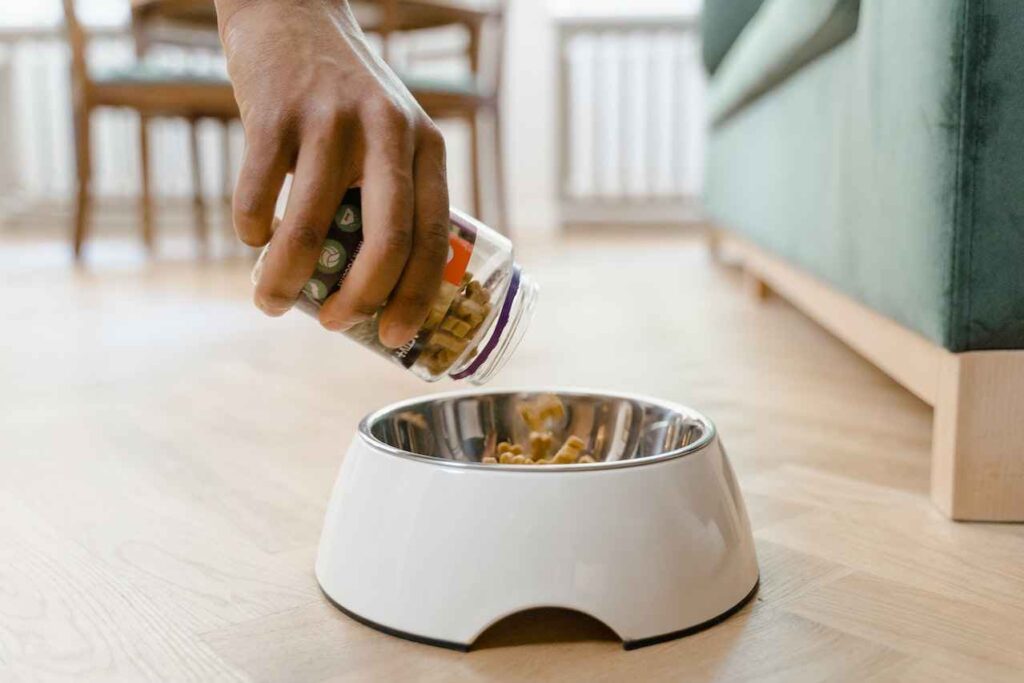bog Dislike the Dog Food.
There are many possible reasons why your dog may dislike dog food. Some dogs may prefer certain flavors or textures, while others may have medical conditions that make it difficult for them to eat certain types of food.
Some dogs may be picky eaters because they have been spoiled with table scraps or other treats, or because they are fed a varied diet that includes both wet and dry food. Ultimately,

the best way to determine why your dog is unwilling to eat dog food is to consult with a veterinarian or animal behaviorist, who can help you identify the underlying cause and develop a plan to address it.
If you are concerned that your dog is not eating enough, it is always a good idea to consult with a veterinarian to determine the cause and get proper treatment or try to figure out any of these.
Palatability of dog food for dogs
Palatability is the term used to describe how appealing a particular food is to an animal. Factors that can affect the palatability of dog food include the smell, taste, texture, and presentation of the food.
Some dogs may be more finicky eaters than others and may require more appealing or high-quality food in order to maintain a healthy appetite.
On the other hand, some dogs may be more prone to food allergies or sensitivities, which can affect their ability to eat certain types of food.
There are a few things you can try if you want to improve the palatability of your dog’s food:
Try Different Dog Foods:
Try switching to a different type of food Some dogs may prefer wet food to dry food or vice versa. Experimenting with different kinds of food may help you find a food that your dog enjoys more.
Add some flavor to Dog Food:
You can try adding a small amount of a flavorful liquid or broth to your dog’s food to make it more appealing. Just be sure to avoid adding too much, as this can cause the food to become nutritionally imbalanced.
Serve the Dog food at the right temperature:
Some dogs may prefer their food to be served at room temperature or slightly warmed, while others may prefer it chilled. Experiment with different serving temperatures to see what your dog prefers.
Offer a variety of Dog foods:
If your dog is getting bored with their food, try offering them a variety of different types of food to keep things interesting. This can include a mix of wet and dry foods, as well as different flavors and textures.
Dog Food Quantity
The appropriate amount of food to feed a dog will depend on several factors, including the dog’s size, age, activity level, and any health conditions they may have. It is generally recommended to follow the feeding guidelines on the dog food packaging, as these will be based on the specific nutritional needs of your dog.
Here are a few general guidelines for determining how much food to feed your dog:

Veterinarian Consultation:
Consult with your veterinarian Your veterinarian can help you determine the appropriate amount of food to feed your dog based on their specific needs.
Follow the feeding guidelines on the dog food packaging:
Most dog food packaging will include a feeding chart that provides recommendations for the appropriate amount of food to feed based on your dog’s weight.
Consider your dog’s activity level:
Active dogs may require more food than less active dogs in order to maintain their energy levels.
Pay attention to your dog’s body condition:
A healthy dog should have a visible waist and their ribs should be easily felt but not visible. If your dog is overweight, you may need to feed them less, and if they are underweight, you may need to feed them more.
It is generally recommended to divide the daily recommended amount of food into two or more smaller meals, rather than feeding a single large meal. This can help prevent gastrointestinal issues and may be more convenient for you as well.
Serve a Nutritionally Balanced Diet:
Nutritionally balanced food is essential for the overall health and well-being of dogs. A nutritionally balanced diet helps to ensure that a dog is getting all of the nutrients they need in the right proportions, including proteins, fats, carbohydrates, vitamins, and minerals.
Immune System Support:
A nutritionally balanced diet can help to support a healthy immune system Adequate nutrition is important for a healthy immune system, which helps to protect against illness and disease.
Promote healthy skin and a shiny coat:
Proper nutrition can help to support healthy skin and a shiny coat, which are indicators of good overall health.
Maintain healthy teeth and gums:
A nutritionally balanced diet can help to support healthy teeth and gums, which can help to prevent dental problems.
Support proper muscle development and maintenance:
Adequate nutrition is essential for proper muscle development and maintenance, which is important for overall health and mobility.
Maintain a healthy weight:
A nutritionally balanced diet can help to maintain a healthy weight, which is important for reducing the risk of obesity-related health problems.
Feeding a nutritionally balanced diet is essential for the overall health and well-being of dogs. It is important to choose high-quality dog food that is formulated to meet the specific nutritional needs of your dog.
Over-Feeding Your Dog
Feeding your dog too many treats could lead them to lose interest in their regular food. Treats should be given in moderation as part of a well-balanced diet, and should not make up a significant portion of a dog’s daily caloric intake.
If you are concerned that your dog is losing interest in their regular food due to overfeeding of treats, there are a few steps you can take to address the issue:
Reduce the number of treats you are giving your dog:
Try gradually decreasing the number of treats you give your dog until they are only receiving a small number of treats per day.

Offer a variety of treats:
If you are giving your dog the same treat every day, they may become bored with it. Try offering a variety of different treats to keep things interesting.
Consider the nutritional value of the treats:
Some treats may be high in calories and low in nutritional value. Treats Choose by you are made with high-quality ingredients and are formulated to meet your dog’s nutritional needs.
It is always a good idea to consult with a veterinarian if you are concerned about your dog’s diet or if they are experiencing any changes in their appetite.
Is health condition affects your dog’s appetite?
Yes, a dog’s health condition can affect its appetite. Certain medical conditions can cause a dog to lose their appetite or become less interested in food. Some common medical conditions that can affect a dog’s appetite include:
Dental problems:
Dental problems, such as tooth decay or gum disease, can cause a dog to lose their appetite due to pain or discomfort when eating.
Digestive issues:
Gastrointestinal problems, such as inflammatory bowel disease or pancreatitis, can cause a dog to lose their appetite or become nauseous after eating.
Infections: Infections,
such as a urinary tract infection or respiratory infection, which can cause a dog to lose their appetite due to the discomfort or illness they are experiencing.
Cancer:
Cancer can cause a dog to lose their appetite due to the illness and treatment they are undergoing.
Other medical conditions:
There are many other medical conditions that can affect a dog’s appetite, including kidney disease, liver disease, and endocrine disorders.
If you are concerned about your dog’s appetite, it is always a good idea to consult with a veterinarian to determine the cause and get proper treatment.

Conclusion:
A nutritionally balanced diet is essential for the overall health and well-being of dogs. It is important to choose high-quality dog food that is formulated to meet the specific nutritional needs of your dog and to pay attention to any changes in your dog’s appetite or eating habits. If you are concerned about your dog’s diet or if they are experiencing any changes in their appetite, it is always a good idea to consult with a veterinarian.
